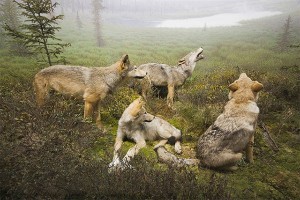Packs of humans howl for wolf sightings

Wolves in Algonquin Park. Photo: JDB Photos, Creative Commons, some rights reserved
This comes from the National Post about a new fad in which “…the hunters become the hunter in Algonquin Park as packs of tourists race around the woods to catch a glimpse of the lupine.”
Yup. Move over pub crawl. Here comes the wolf howl. As a non-clandestine activity. The Friends of Algonquin Park organization actually holds these as scheduled events:
Wolf howling expeditions take place only on Thursdays in August, or in September before Labour Day, when weather and accessible wolves permit. We have a slide talk on wolf ecology and our changing perceptions of this elusive animal; event protocol is provided; and then we travel by car (on rare occasions, we walk) to a place where wild wolves may answer the imitations given by the Naturalist staff.
According to the Post article, “one August” this activity was once picked up by NORAD as an unidentified – something – that warranted a closer look.
Security personnel stared at their computer screens wondering what on Earth they were looking at. They called Canadian defence headquarters in Ottawa. Everyone breathed easier when they learned it was a cavalcade of 500 cars moving bumper-to-bumper through Algonquin Park on a wolf howl.
I’m not sure I believe that account. (Did NORAD confirm this?) But perhaps it happened that way. It makes a good story, doesn’t it?
Here’s a video from Global news 16×9 about wolf howl events in Algonquin Park from 2012.
Poking around the Internet, one can find various wolf howl type events in a number of places from Missouri and North Carolina to South Salem New York.
Here’s more about actual wolf howls from PBS’s Nova.
Are there wolves where you live? When do you hear their howls?
Tags: Algonquin Park, canada, ecology, environment, science, wolf howl, wolves








Nice video. I have always liked wolves.
I respect wolves, I am not sure 500 cars driving around trying to find them is a good thing? Why can’t we just leave them alone? Same goes for sharks.
I have heard wolves in the Grand Tetons, in fact it is not uncommon to hear them there. But you don’t have to go chasing after them, I was sitting in Driggs Idaho on a back porch and heard them.
Sometime back I recall listening to an NCPR article concerning a study by Canadian biologists who had conducted DNA analyses on the colloquially named coydogs which supposedly inhabit the northeastern US and southeastern Canada. As a young-un living near the Ranger School in Wanakena back in the early 50’s I had been informed via conventional wisdom that coydogs were a hybrid cross between coyotes and domestic dogs. Turns out, as with much of conventional wisdom, it was incorrect. It has been fairly conclusively established that so called coydogs are in actuality coywolves. Experimental, purposeful, interbreeding between coyotes and domestic dogs demonstrated that subsequent to about three generations the “true” coydogs became effectively coymules in that they were by and large sterile. Sterility, a prevalence for disease/infection coupled with inopportune breeding cycles, contributed by the dogs gene pool, makes it nearly impossible for a viable true hybrid coydog population to exist in the wild.
Therefore anytime you have the desire to hear wolves simply observe your house pet dogs and if they appear agitated and break out in howling for no apparent reason; step out the back door with them and listen for the howls of the coywolves. Unfortunately the coywolves sound more as coyotes do; however, my Shepards sound more as wolves when they return their howls. Coywolves visit me and my crew regularly the year around.